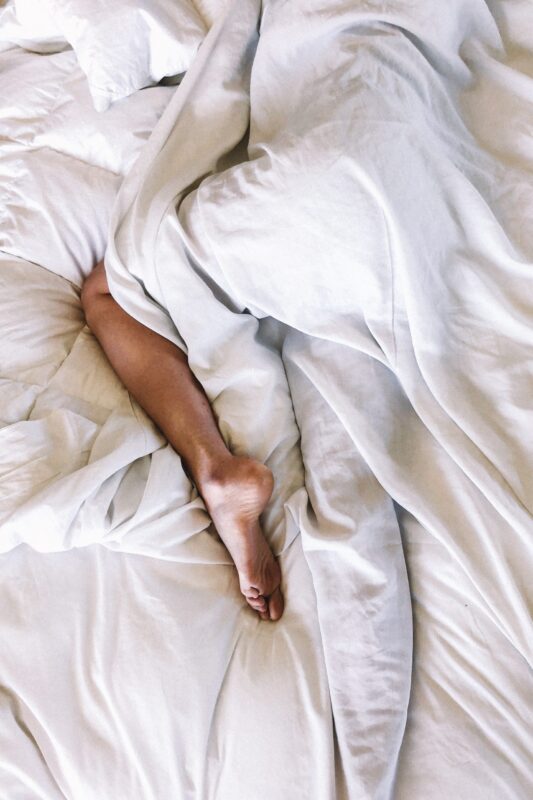“Early to bed and early to rise makes a man healthy, wealthy, and wise,” wrote Benjamin Franklin in Poor Richard’s Almanack in the 18th century. “It’s important to get enough sleep. Sleep helps keep your mind and body healthy,” reads more recent advice from the US Department of Health and Human Services.
Getting enough sleep can also help keep your alcohol use down. A recent study conducted by researchers at Penn State University found that better sleep habits reduced hazardous drinking among young adults.
For the study, 222 regular drinking adults between the ages of 21 and 29—63 percent of whom were female—wore an alcohol monitor to continuously measure transdermal alcohol concentration (TAC) for 6 days. Participants completed daily smartphone-based surveys reporting the previous night’s number of drinks and sleep. Researchers used sleep variables to predict next-day alcohol use and alcohol consumption variables to predict subsequent sleep.
Researchers found that participants who tended to go to bed later consumed 24 percent more drinks on average and recorded a 26 percent higher TAC the following day. Each additional hour of sleep the prior night was associated with a 14 percent decrease in next-day alcohol consumption. On nights in which participants consumed more alcohol, they went to bed on average 8 to 13 minutes later than usual and reported worse sleep quality.
“Young adults who went to bed earlier and slept longer on average tended to use alcohol less the next day, and using less alcohol tended to improve subsequent sleep within young adults,” the researchers wrote in their conclusion, “Taken together, these results suggest that better sleep health may improve drinking behaviors and intoxication dynamics, which may have implications for interventions targeting sleep as a mechanism to reduce heavy drinking.”
“Sleep problems are a common complaint among people with substance use disorders (SUDs),” according to a brief published by the federal Substance Abuse and Mental Health Services Administration (SAMHSA). “They can occur during withdrawal, but they can also last months and years into recovery and can be associated with relapse to substance use.”
A healthy sleep pattern tends to reduce stress and improve mood while lack or sleep frequently makes people irritable and anxious. Stress and anxiety may then lead to an escalation of substance misuse in an attempt to self-medicate that stress.
It’s a vicious feedback loop full of dangers for people with addiction. Substance misuse can exacerbate sleep difficulties, which in turn drive further substance use or present a significant relapse risk for people in recovery.
The types of sleep problems vary by substance used and can include insomnia, sleep latency (the time it takes to fall asleep), disturbances in sleep cycles and sleep continuity, or hypersomnia (excessive daytime sleepiness).
SAMHSA offers a few tips to promote sleep hygiene:
- Go to bed and get up at the same times each day
- Exercise regularly
- Use natural light to remind yourself of when it’s time to be asleep and awake
- Don’t eat or drink too much close to bedtime
- If you take naps, keep them short and before 5 pm
- Avoid caffeine and nicotine for several hours before bedtime
- Wind down before going to bed
- Keep the bedroom a relaxing place
- Sleep in a dark, quiet room that isn’t too hot or too cold
- If you can’t fall asleep within 20 minutes, get up and do something relaxing
People with SUD often suffer from co-occurring mental health conditions that can be exacerbated by sleep deprivation. Such underlying conditions need to be addressed as soon as possible, concurrently with addiction treatment.
Valiant Living Detox and Assessment is a sophisticated launching pad for addiction treatment, providing a comprehensive set of services to men and women age 18 and older. At Valiant Living, we recognize the link between mental health and substance use disorders. Our experienced clinical team utilizes an integrative approach to detox that focuses on treating and managing the psychiatric symptoms of dual diagnosis patients while addressing their substance use issues.
By employing a variety of psychotherapies, holistic modalities, medication management and more, we promote a more favorable treatment outcome by ensuring that patients are thoroughly prepared for the remainder of their recovery journey once they complete detox.
If you are seeking a more comprehensive start for your treatment of addiction, contact us at 303-647-4932. Get the individualized attention you need for stabilization, assessment, and discerning the best next steps in your journey.




